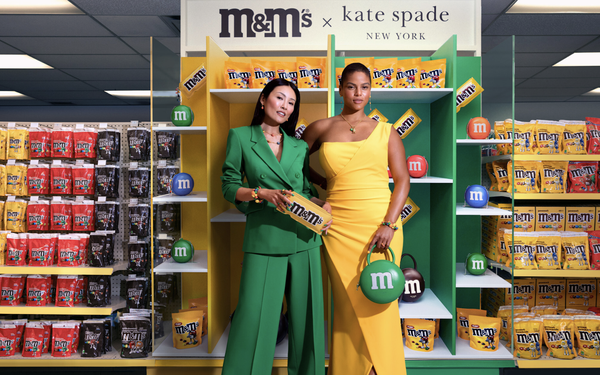 Image above: M&Ms was the
top-performing food brand at number 6 on the list.
Image above: M&Ms was the
top-performing food brand at number 6 on the list.
Collage Group published its “2025 State of Brand Cultural Fluency” report, finding an average improvement of 4.5%
for the first half of 2025, compared with the second half of 2024 “a signal that more brands are embedding cultural intelligence into their strategies.”
.Collage Group defines
“cultural fluency” as a brand’s ability to use cultural intelligence to connect with consumers across all consumer segments—including gender, race and ethnicity, age, parental
status, and lifestyle.
The report utilized “nationally representative” insights across 1,200 brands and assigned each brand a brand cultural fluency quotient (B-CFQ) score.
The largest improvements over the six-month period were found across industries including alcoholic beverages, entertainment, health insurance, and telecom, which Collage characterized as
“sectors often challenged by consumer trust and complexity that are now demonstrating transformation and growth potential.” Telecom was still one of the industries categorized as
“well below average” in the attribute, along with healthcare and social media.
advertisement
advertisement
The list of the top 20 most culturally fluent brands was dominated by household staples, but also
spanned categories including food/snacks, electronics (Sony was 9th on the list), and tech. Visa was the only financial services brand to crack the list, at number 17. Band-Aid led the top
5, followed by Dawn, Lysol, Vick’s, and Clorox. M&Ms was the top-performing food brand at number 6, followed by Hershey’s and Nestle at 11 and 12, respectively. Alphabet’s Google
and YouTube both cracked the list, at 15 and 20.
The report also stressed the connection between cultural fluency and business success, calling it a “business imperative.”
“As multicultural consumers continue to drive market growth and new generations redefine mainstream culture,” Collage wrote in the report, “brands that invest in cultural
intelligence today are best positioned for sustainable leadership tomorrow.”
“By better aligning with values and beliefs across different consumer segments, brands can create a
competitive advantage,” Collage co-founder and CEO David Wellisch said in a statement.